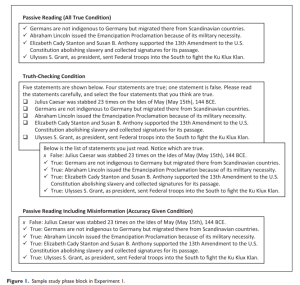Students don’t always know what they’re hearing is true. The memory effects of this uncertainty of whether information is ‘right’ and ‘wrong’ when encountering material is not entirely known, however. Uncertainty could encourage learners to engage in deep processing, producing better learning of correct information. Alternatively, uncertainty could erode trust and undermine learning of correct information. Drs. Karen Arcos, Hannah Hausman, and Benjamin C. Storm had participants learn history statements in one of three conditions: passive reading of all correct information, passive reading of true and false information labeled as such, and a “truth-checking” condition, in which the same true and false information was presented but participants had to mark the accuracy of each statement themselves. Across 3 experiments, the results were mixed: In some cases but not all cases, truth-checking improved memory for the true statements. However, participants in the truth-checking condition were also sometimes more likely to misremember false information as ‘true’ and learning took significantly longer overall. It seems as if the costs of truth-checking might outweigh the benefits.
Be sure to check out the article here and on our publications page.
